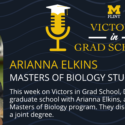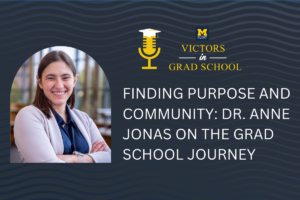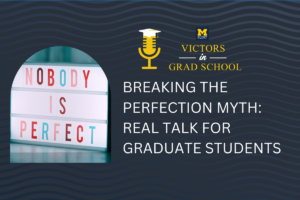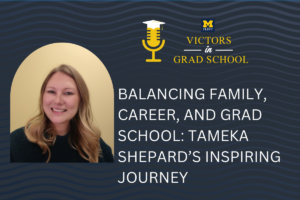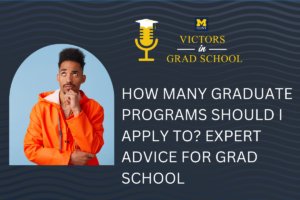Dr. Christopher Lewis, the host of Victor’s in Grad School, recently had a compelling conversation with Arianna Elkins, a student in the master’s in biology program at the University of Michigan Flint. The discussion delved into her journey from undergraduate to graduate studies, the decision to pursue a joint degree program, the importance of balance and time management as a graduate student, and her aspirations for the future. Arianna shared insights and tips that can benefit students considering graduate school and those already on the path to academic and professional success.
Taking Advantage of Joint Degree Programs
Arianna’s decision to pursue a joint degree program during her undergraduate studies highlights the benefits of seizing educational opportunities. Through the initiative offered by the University of Michigan Flint, Arianna was able to streamline her educational path and make progress towards her master’s degree while completing her bachelor’s. The availability of such programs, which allow certain undergraduate courses to count toward a master’s degree, can be invaluable for students aiming to accelerate their academic journey while reducing the overall time and financial commitment required for advanced studies.
Finding Passion and Purpose in Academic Pursuits
Arianna’s journey from undergraduate research assistant to pursuing a master’s thesis in biology exemplifies the transformative power of educational experiences. Her involvement in an aquatic science project not only fueled her passion but also set her on a trajectory towards her desired career in natural resource management. This demonstrates the significance of gaining practical experience and finding alignment between academic pursuits and personal aspirations. Students aspiring for success in graduate school can benefit from actively seeking out research opportunities and aligning academic endeavors with future career goals.
Balancing Responsibilities in Graduate School
A key aspect of Arianna’s discussion was the importance of balance and time management as a graduate student. Balancing coursework, research obligations, and professional responsibilities requires deliberate planning and self-discipline. Arianna’s approach involved setting priorities, establishing boundaries, and creating a schedule that allowed her to seamlessly integrate her roles as a student, researcher, and professional. Her experience underscores the significance of striking a balance to prevent burnout and ensure holistic well-being while pursuing advanced education.
Navigating the Path Forward
As Arianna approaches the culmination of her master’s program, her aspirations encompass a blend of professional engagement and educational progression. Her plans to venture into natural resource management and then potentially return for a PhD, coupled with a desire to mentor future students, reflect a forward-thinking approach to career development. Her trajectory serves as an inspiration for students to envision the broader implications of their graduate education and consider how it aligns with their future career goals and aspirations.
Advice for Prospective Graduate Students
Arianna’s insights culminated in practical advice for individuals considering graduate school. Her emphasis on researching job requirements, identifying potential skill gaps, and leveraging networking opportunities illuminates an essential aspect of preparing for postgraduate endeavors. This advice illuminates the significance of informed decision-making and proactive engagement in shaping one’s academic and professional trajectory.
In conclusion, Arianna Elkins’ journey through the master’s in biology program at the University of Michigan Flint showcases the transformative impact of educational opportunities, personal passion, and strategic planning. Her insights and experiences offer valuable guidance for aspiring and current graduate students seeking to navigate the complexities of advanced education with purpose, balance, and a clear vision for the future. As her journey continues, Arianna’s story serves as both an inspiration and a practical guide for those navigating the challenges and opportunities of graduate school.
TRANSCRIPT
Dr. Christopher Lewis [00:00:01]:
Welcome to the Victor’s in Grad School, where we have conversations with students, alumni, and experts about what it takes to find success in graduate school.
Dr. Christopher Lewis [00:00:11]:
Welcome back to Victor’s in Grad School. I’m your host, Dr. Christopher Lewis, director of graduate programs at the University of Michigan Flint. Really excited to have you back again this week. Every week, I love being able to sit down with you, to talk to you, to work with you as you are looking at graduate school No matter where you are in this journey, and it is a journey. It is a journey that you’re on, whether you are still in that undergraduate degree looking at future whether you’re in a graduate program and you’re seeing the light at the end of the tunnel and and working through in that way as well, there are always things that you can do To find success in the journey that you’re on. And that’s what this podcast is all about. I love being able to sit down with you and work with you on this because there are tips and tricks and things that you can learn from others. And that’s why every week I love being able to bring you different people that have gone before you or that are going through it right now and that can give you some of their own insights to help you In the journey that you have chosen to go on as well.
Dr. Christopher Lewis [00:01:17]:
This week, we’ve got another great guest. Ariana Elkins is with us. And Ariana is a student in the master’s in biology program at the University of Michigan Flint. She did her undergraduate work also at the University of Michigan Flint, and we’re gonna talk about that. She took advantage of a couple of different opportunities As she was going through her undergrad that allowed her to be able to work toward that master’s degree. So I’m really excited to have her here and have her Share her journey with you. Ariana, thanks so much for being here today.
Arianna Elkins [00:01:51]:
Thank you. Thanks for having me.
Dr. Christopher Lewis [00:01:53]:
It is my pleasure having you here today. I really appreciate you Sharing your own experience because typically what I do, I love going back and having you really talk about this journey that you’re on. And I guess for you, you just finished your bachelor’s degree. But while you were going through your bachelor’s degree, you made a decision. You made a decision to Take advantage of a joint degree program. And for those of you that don’t know or are on campuses that don’t have these, a joint degree program is a program that allows for you while you’re going through that undergraduate program to take courses as an undergraduate That will also count toward a master’s degree. So Ariana took advantage of that while she was going through that bachelor’s in biology to also work on a master’s. Now so let’s go back in time a little bit, Ariana, and tell me about what made you just choose that you wanted to take advantage of this Joint degree program and what, really, what made you choose that you wanted to go beyond the bachelor’s to get the master’s in general?
Arianna Elkins [00:02:55]:
Yeah. So There was talk about this program being brought to campus. They were in the process of developing it, so I knew it was coming. And I felt really lucky that my My last semester of undergrad, it became available for us to take advantage of that. So, really, without thinking, I did it. Allows you to save money, save some time, and it is a little bit of an added challenge. You’re taking an undergraduate class, but there’s a little bit extra work in there to Have it count for a graduate class as well. So I was really happy that I had the opportunity to save money.
Arianna Elkins [00:03:31]:
That was probably The biggest reason for doing it. So what got me into wanting to continue my education onto my master’s degree, I had the opportunity to work as an undergrad research assistant on another master’s student project. And it was involved in biology. That master’s student just happened to be my good friend. So having the opportunity to work on campus, get paid on campus, and learn something new, I really didn’t think twice about that opportunity either. So I found myself working on an aquatic science project. We were, For the most part, catching fish on the river. And when I first started, I couldn’t even touch a fish.
Arianna Elkins [00:04:15]:
I was absolutely terrified of them. It wasn’t anything that I saw myself doing or enjoying, but very quickly, Not only did I enjoy it, I had I loved it. I had a great passion for it. So I actually had the opportunity. I was very, very lucky to continue Onto that project, kind of take the torch, and now I’m continuing that project as my master’s thesis. So I knew that I could probably go somewhere else and get a master’s degree, maybe move, have a different experience. But I knew the adviser that I would be working with, and I knew the project. So I really felt that I was just in a really good place at The perfect time, and so I took that opportunity and continued on to master’s.
Dr. Christopher Lewis [00:05:01]:
So you just talked about the fact that you could’ve decided to just Finish off your bachelor’s degree. You’re toward the end of your bachelor’s degree, so you could have done that and and gotten that different experience. What was it about the program at the University of Michigan Flint that really made you say, no. I wanna do this joint degree. I wanna stay, And I wanna get my master’s at the same institution where I got my bachelor’s.
Arianna Elkins [00:05:25]:
Master’s is a lot different as most people probably know. It’s not as credit and coursework based. So I knew that continuing on to my master’s, In addition to working with my adviser more, I would be getting the added aspect of Scientific methodology and completing a research project as my thesis, which can not only be applied to fishery science, which is My goal where I’m where I’m wanting to go with my career, but can be really applied to any STEM field, anthropology as well. Really, any research project is once you understand the gist of it, you kind of understand how to do research and how to discover things Pertaining to anything in science.
Dr. Christopher Lewis [00:06:16]:
So when you were doing this joint degree program, you Had the opportunity, like you said, to do courses and then do a bit more to be able to have them count for graduate work. And every person has to go through a process of doing a transition. A transition, like you said, the way that courses are taught are different. The expectations are different, and you have to get into a different type of mindset. So as you transitioned into that graduate program into becoming a graduate student. What did you have to do to set yourself up for success? And what did you have to do to maintain that success as you were going through the entire program?
Arianna Elkins [00:07:01]:
I would say The university helped a lot with that. In your undergrad, you do a lot of that scientific reading and writing, and I felt like they really helped with my segue into my master’s degree. But on a personal level, you definitely have to have time management skills. I know a lot of people live at home, but I don’t live at home anymore. So on top of getting a degree and making sure that that’s my Prime focus is advancing my education. I also have to have time to work and hobbies and things like that. So time management is a huge thing for me. That comes with self discipline, making sure that you’re Getting a good amount of sleep so that you can wake up the next day, get everything you need to done, get everything that you need to get done, and then you kinda have time for your Hobbies and taking care of yourself in the house and stuff like that.
Arianna Elkins [00:07:52]:
So time management partnered with a lot of self discipline and organization skills is what kind of helped my segue into my master’s degree.
Dr. Christopher Lewis [00:08:01]:
So talk to me a little bit about balance because as you said, You’ve had to work on top of being a graduate student, and you hold a managerial position. You know, you’re you’re working as a manager. You’re doing that outside of work. You’re doing research and having to maintain that research. You’ve got courses, And you’ve got to be able to keep on top of all of that, to be able to have that success in the courses that you want. So how have you been able to balance all of that and find success in the way that you’ve been able to balance that.
Arianna Elkins [00:08:35]:
Truthfully, I experienced a lot of burnout in my undergrad. I think with just the heavy Course load. There was a lot of things each day that I had to do versus now my workload is Things that I want to do. It’s I have this big time line to conduct a thesis, but it’s essentially at my own pace. Those are deadlines that I have set for myself with a little bit help from my advisor. So the transition into my master’s degree with that Flexibility in my schedule really helped me balance my life, my hobbies, my health, eating healthy, things like that.
Dr. Christopher Lewis [00:09:16]:
So it sounds like you have to really find the priorities and set those priorities for yourself And then be able to deconstruct that. So if you have to work, you have to work, but then having to figure out, okay, if I’m working if I have to work, I have to Schedule so much time to do this, but I also have to have time to do the other things that you have to do to be able to get through the courses, get through the research, get through all of that. Is that what you’re saying?
Arianna Elkins [00:09:41]:
Yeah. Absolutely. I think scheduling is a really big part of it. You have a boss that schedules you specific Times to work, but it’s also at least for me, it works the best if I then have a set time that I’m working on my thesis or that I’m working on my classwork.
Dr. Christopher Lewis [00:10:00]:
So you have about a year left in your program right now. And as you are starting to look at the future, what does the future look like for view. And where do you wanna go, and what do you wanna do next?
Arianna Elkins [00:10:10]:
After I finish my thesis, which I think is going to be a really big push In the most recent future, I am planning on just getting out there and seeing what kind of jobs I can attain In natural resource management, I mentioned earlier, I’m hoping to be fisheries based, but really anything A natural resource management in the area would make me happy. And then I’m planning. I really like the idea of teaching and mentoring students. So I’m planning on getting some real world applications and education, and then maybe coming back and completing a PhD and And later being a professor so that I can share my education experience as well as the real world experience that I’ve gained.
Dr. Christopher Lewis [00:10:58]:
So So as you think about the experience that you’ve gone through thus far, and I know you’re still in graduate school now. And as you’re talking to Other undergraduate students at your own institution or as you think about the journey that you’ve gone on, What are some tips that you might offer to others that are considering graduate school that would help them find success sooner?
Arianna Elkins [00:11:22]:
Well, the first thing I would say is hang in there. Undergraduate is very coursework heavy and in my experience can be very draining. But the next thing thing I would recommend is start looking at jobs. Start looking at the requirements that they’re asking. If Just having your bachelor’s degree is going to give you a job that has the pay that you’re looking for, if you even have the requirements that they’re asking for, really just determining if your bachelor’s is gonna be enough for something that you wanna do. That was A reason that I continued with my master’s, I felt like it just opened up more opportunities for me having, a higher education. So I would just say start looking at the requirements that they’re asking for on jobs and might give you an idea of if you need to do more networking on campus or if you need to do more volunteer opportunities or just ways that you might be able to fill the gaps in on your resume.
Dr. Christopher Lewis [00:12:20]:
Great tips. I really appreciate it. I really appreciate you sharing all of this today, Ariana. And I am really looking forward to Hearing what your next steps are and seeing where you go from here. But I truly appreciate your time and appreciate you sharing all of this, and I wish you all the best.
Arianna Elkins [00:12:37]:
Thank you. Thank you for having me. It was great, and I hope that someone finds some good tips and some help from this.
Dr. Christopher Lewis [00:12:44]:
The University of Michigan Flint has a full array of masters and doctorate programs if you are interested in continuing your education. Whether you’re looking or in person or online learning options. The University of Michigan Flint has programs that will meet your needs. For more information on any of our graduate programs, visit umflint.edu/graduate programs to find out more. Thanks again for spending time with me as you prepare to be a Victor in grad school. I look forward to speaking with you again soon as we embark together on your graduate school journey. If you have any questions or want to reach out, Email me at flintgradoffice@umflint.edu.

